|
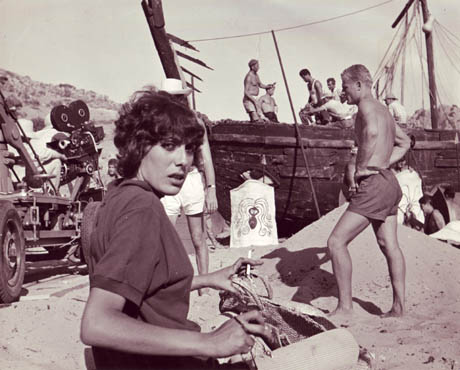
Today I justified the “movie
producer” title on my business card. The movie
is the Iliad. The production has a cast
of 1200 extras. The crew from Munich– Cameraman
Werner Kurz, Special effects supervisor Karl Baumgartner
and Script girl Pia Arnold– actually began shooting
the film two days ago at Tolon, a beach about 120 miles
from Athens. I left my collaborator Susan Brockman in
charge in Tolon and I am back in Athens to look at the
rushes.
The shooting script, by Mario
Puzo, the civilian administrator of the 442nd Army
Reserve unit in New York, opens with a huge battle around
the Greeks’ beached ships.
For that spectacular scene, Susan and I had meticulously
assembled the ships, shields, costumes and other requisites.
The Greek government had been most cooperative. For
ships, the port of Piraeus had contributed 6 water-logged
hulls long sunk in a caique graveyard outside the harbor.
Then shipping tycoon Stavros Niarchos contributed a
floating crane to raise and load them on to a LST landing
craft--the L188-- supplied by the Greek Navy. The L188
then ferried them to the location. ( Unfortunately the
LST broke its propeller unloading the cargo in shallow
water.)
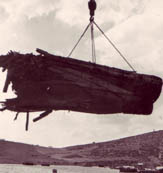
The local authorities then supplied a work gang of prisoners
to reconstruct the ships. For masts, I had the cooperative
prisoners borrow telephone poles from the surrounding
area ( temporarily interrupting local telephone service.)
And the Greek Army, at the request of the Ministry of
the Interior, supplied 1,200 extras, who were outfitted
in loincloths and sandals by student interns attracted
by the illusionary rumor that Marlon Brando would be
arriving.
Despite all these efforts, the new director, Desmond
O’Donovan, claimed that it was too cloudy to shoot
battle scenes. Instead, he wrote a"weather contingency"
scene in which a dog snatches a piece of meat from a
pot at a campfire. He said it would provide a “cinematic
metaphor” to depict the hard times the Greeks
were suffering in their siege of Troy.
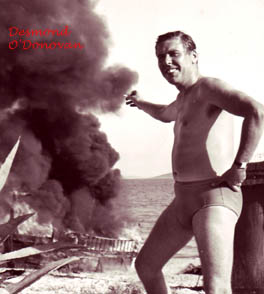
Now, in the aptly-named
Apollo screening room in Athens, I watch the results
of this contingency with horror. There are 37 retakes
of the mangy dog . Meanwhile, I am billed daily for
the cases of orangeade and mounds of sis kebab the 1,200
hungry extras consume while they wait for the sun, draining
a significant portion of my $36,000 production budget.
Watching the rushes with
me are three visitors from Hollywood: Polish-born Rudy
Mate, Russian-born George St. George, and Italian
born Maria. Rudy had been a legendary cinematographer--
photographing Dryer's classic The Passion Of Joan
of Arc-- before becoming a Hollywood hack director.
He is now in Athens to scout locations for his next
film, The Lion of Sparta. St. George, who had
escaped the Russian revolution via Shanghai and wound
up in Hollywood, is his producer and sidekick. Maria,
a barely-legal actress, is Rudy's lover. I had met them
earlier in the day in the lobby of the Grand Bretagne
hotel and invited them to the screening.
“Interesting ,” Rudy Mate says, after the
dog’s 20th lunge at the bone. (I later learn from
Maria that “Interesting” is Mate codeword
for “awful”). “I’m not sure
I am familiar with this director O’Donovan..”
“It is his first film,” I reply.
I add that the script
is also by a first-time writer, Mario Puzo.
St. George, intrigued by the
cooperation I am getting from the Greek government,
asks "How did you get the Greek Army?"
More to the point, Maria asks,
“How did you get in this mess?”
Over dessert in the Cafe Floca, I explained how what
had began as a love story had turned into an organized
flight from reality (with me as tour leader).
The adventure traced back to my temporarily suspension
from Cornell. As my penance, I read Richmond Lattimore's
translation of the Iliad. This effort might have ended
in no more than the usual cerebral exercise if not for
two coincidences. First, Susan Brockman, a Cornell coed
I fancied, on seeing my conspicuously-toted Iliad, said
that it was her life’s ambition--at least that
week-- to play Helen of Troy in a movie. Second, I read
a New York Times story that Zervos Pictures in Athens
and Mosfilms in Moscow had tentatively agreed to make
a Russian-Greek coproduction of the Iliad.
Seizing the opportunity, I
dashed off a telegram to Zervos Pictures: “IF
YOU ARE NOT IRREVOCABLY COMMITTED TO THE RUSSIANS, WOULD
YOU CONSIDER DOING INSTEAD AN AMERICAN COPRODUCTION
WITH MARLON BRANDO AS ACHILLES, JAMES MASON AS AGAMMEMNON,
RICHARD BOONE AS ODYSSEUS AND SUSAN BROCKMAN AS HELEN
OF TROY.”
I could not send it immediately because I was concerned
about my return address. I was living at my parents’
home in Rockville Center and feared that asking Zervos
to reply to Ed Epstein, c/o Betty&Lou Epstein might
cast my credibility as a producer in question. Susan’s
sorority house at Cornell, Alpha Epsilon Phi, had a
similar problem, but Susan found the solution: her father.
David Brockman, was a successful financier,
with a large office, and impressive cable address: GILESACT
NEW YORK, which I used as my return address.
About a week later David Brockman
received a telegram from George Zervos, the President
of Zervos Pictures . “I AM WILLING TO PUT UP 7
MILLION DOLLARS FOR BELOW-THE-LINE PRODUCTION STOP PREFER
TO DO THE ILIAD WITH EPSTEIN’S COMPANY INSTEAD
OF THE RUSSIANS.” As David Brockman had not seen
my original telegram offering to provide Marlon Brando,
he was impressed that someone would offer a friend of
his daughter $7 million. He asked Susan to arrange for
me to meet him and Arnold Krakower, a successful NY
divorce lawyer. The meeting then expanded to include
another of Brockman's associates, Ben Javits. Ben was
the brother, eminence grise and law partner (Javits
& Javits) of New York Senator Jacob Javits.
It turned out he reveled in influencing world events,
or at least Grecian ones. He especially liked
the idea of blocking a Russian coproduction and offered
to have his brother write letters to everyone who mattered
in Greece.
Even though I had not
previously conceived of my adventure as part of the
Cold War, I accepted his offer. Why not block the Russians?
At Krakower's suggestion, we formed a partnership–
Iliad Productions, Inc– in which he and Brockman
and Krakower would provide the initial money for preproduction.
“You have to go to Athens right away,” Javits
said, adding urgency.
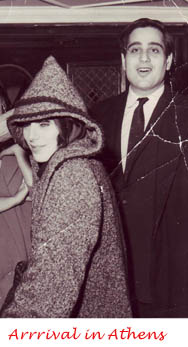
A few days later, September
15,1959, Susan and I made our initial trip to Greece.
Her father, who owned among many industrial companies
a travel agency, provided us with first class tickets
to Athens on a KLM “sleeper” flight. As
he had promised, Javits had opened all the doors for
us. Over the next week we met government ministers,
shipping magnates, and others in the Athens power elite
that responded to Javits' letter. And we had a
great time being wined and dined in tavernas.
The first deal I made was with Spyros
D. Skouras, the namesake nephew of Spyros Skouras, the
Chairman of 20th Century Fox. Skouras owned a
local film studio in Athens (Skouras Films) as well
as the lucrative Eastman Kodak film franchise for all
of Greece. After he listened to my plan
for the Iliad, he asked who would play Achilles.
When he heard Brando’s name, he became so excited
that he wanted to sign a contract that day. “Forget
Zervos, forget the Russians, I will be your partner
– but you must get Brando.” I told him Brando
had not yet agreed. “He will,” Skouras said.
Two days later, Skouras and I signed a “memorandum
of understanding” in which I would supply Brando,
the script and the director, and Skouras would pay for
the production in Greece.
Next, Minister of Industry
Nicholas Martis, moved by Javits’s letter, offered
a battalion of soldiers from the Greek army, horses
from the King’s guards, and whatever else I needed
for the Iliad. He then said he would also like to host
a small dinner at his home for Brando. “When will
Marlon arrive?” I explained Brando would need
to approve the script.
“Just give him Homer’s Iliad to read,”
Minister Martis suggested. He wrote a letter stating
“I will do everything in my power to ensure that
every reasonable facility is provided by the authorities.”

With this impressive-looking letter
from Minister Martis and the agreement with Skouras
Films, Susan and I triumphantly returned to New York.
A telegram was waiting from Skouras: “DEAR ED,
IT HAS BECOME AN OBSESSION WITH ME. WE MUST GET BRANDO
FOR OUR PICTURE..SPYROS.”
By this time, Arnold
Krakower had taken a direct hand in the search for the
director. As a top divorce lawyer, he had dealt with
the director Sidney Lumet,
whose divorce from Gloria Vanderbilt he was handling.
To accommodate Krakower, Lumet invited me for breakfast
at his penthouse at 10 Gracie Square, which overlooked
the Mayor’s mansion. Lumet, though only
36, was no amateur. The son of an actor and dancer,
he had made his stage debut at the age of 4 in 1928
at the Yiddish Art Theater. He had been nominated for
an academy award for directing 12 Angry Men.
After selecting my breakfast from a plate of smoked
salmon, I asked him about Brando, whom he had just directed
wearing a snakeskin jacket in The Fugitive Kind.
He said Brando would
be perfect, and he would be “keenly interested”
in directing it once Brando signed on. He then asked,
“Do you have a script?”
“I’m still working on it.” Actually,
all I had was a 30 page treatment written on spec by
a very talented playwright, Sloane Elliott. Sloane,
who was also a classicist, was an aficionado of Homer--
and had travelled to almost all the Greek islands.
He was not, however, interested in writing a shooting
script.
A script was not my only problem. “Once
you have a script, you will need to put $500,000 in
an escrow account before Brando’s agent, Audrey
Woods, will allow him to read a page of it.”
I had neither a script nor
$500,000. Having made these cold facts of the
conventional movie business clear to me, Lumet politely
ended the breakfast, and walked me to the elevator.
While awaiting it, I told him that the Greek government
was providing its Army for the battle scenes, and that
Spyros Skouras was willing to finance the shooting of
those scenes.
“I guess you could shoot the battle scenes with
a second-unit,” he said, as the elevator doors
opened.
“With Achilles wearing a mask?” I asked.
“So Brando could still be used by the first unit?”
“Lets see how they turn out, bye .”
As my vertical chariot whisked
me down from the penthouse, I grasped a new strategy:
To first shoot the battle scenes in Greece with a second
unit and then get Lumet to direct Brando in a studio
in America. But I still would need a script.
A second problem was
the American draft. Being suspended from Cornell, I
could be drafted at any moment by the U.S. Army and
that might provide unwanted experience in non-Homeric
battle scenes. The alternative to the draft was joining
a reserve unit but, given the number of men with the
same idea, all the reserve units had long waiting lists.
As it happened, my cousin had a means to jump the cue.
He steered me to a very influencable civilian administrator
at the 442nd Bagel-baking reserve, Mario Puzo. Puzo,
though only 39, looked like an overweight wreck. When
he told me he was a writer– even if for magazines
with names like Stag– I told him I needed a screen
writer for the Iliad. A deal was instantly struck to
kill two birds with a single stone : Mario would slip
me in a reserve unit in such a way that it would not
interfere with my activities as a movie producer; I
would pay Mario $400 for a 40 page shooting script for
the battle scenes. After I brought Puzo to meet Krakower,
he said “I’ll give him the $400 and a contract,
but no one will ever believe this guy is a writer.”
Puzo did deliver, however, the promised script.
Krakower showed no enthusiasm
for a bifurcated movie. “You need a single director,”
he said authoritatively and found a candidate: Lewis
Milestone.
Milestone was an old timer par excellence. In 1927,
he had won the first (and only) academy award given
for Best Comedy Director. When Krakower had recently
met Milestone at a Hollywood dinner, Milestone had complained
that because of age discrimination he could not get
a picture to direct. So Krakower proposed the Iliad
and Milestone showed “real interest in getting
back in the game,” as Krakower put it. After our
initial meeting, where I gave him Puzo’s script,
we then carried on a month long correspondence about
Homer. It ended abruptly when he found out I could not
pay his fee– or any fee– in advance.
Returning to the idea of splitting
the movie, I found Gregg Tallas. Born Grigoris Thalassinos
in Athens, Tallas was down on his luck in America–and
broke– and wanted to go back to Greece. His directorial
experience had been limited to two films Prehistoric
Women and Sirens of Atlantis he did ten years ago, both
of which failed at the box office. Although Tallas claimed
to have directed the Second Unit on Gone With The Wind,
he received no credit for it.
Despite his lack of credentials,
he had one real advantage: he was willing to defer his
compensation until the film was finished. All he asked
for was a first class ticket to Athens. Since I could
get the first class ticket gratis from Brockman’s
travel agency, and desperately needed a director, I
hired him for the 2nd Unit (hoping, without any real
basis, Lumet might later take over the First unit.)
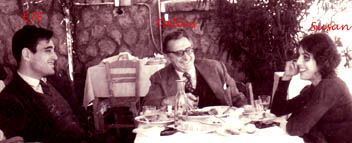
On July 15th, I
returned to Greece with Susan and Tallas-- and $50,000
raised from Brockman, Krakower, Sloane Elliott and my
father. We moved into the King George Hotel, where the
owner, George Calcannis, anticipating the arrival of
Marlon Brando, had given us the bridal suite.
Finding the right location
for the Iliad proved much more time consuming than I
had anticipated. In late July, the Greek Navy provided
us with a spare gunboat, the BB36, to scout locations
on various Greek islands. We saw almost as many islands
as Odysseus– Skiros, Andros, Hydra, Patmos, Lesbos,
and Thera– with beautiful beaches, but none had
the requisite electricity, hotels, or airport connection.
Fortunately, by the time we returned from our futile
search, Minister Martis had found the ideal location:
a not-yet-occupied hotel on a deserted beach at Tolon
that the Ministry of Tourist would provide free. He
added “Brando will be the first guest.”
Meanwhile, director Tallas
had become a problem. He also refused to work from Puzo’s
shooting script, saying it was “unprofessional.”
More damaging, he added to Skouras’ angst by telling
him “Hell will freeze over before Brando comes
to Greece.” But matters really came to a head
when he told Colonel Cactemilitus, our liaison with
the Greek Army, that the call sheets I had given him
specifying how many extras were needed each day were
“Plucked out of thin air.” In the midst
of his subversive conversation with the Colonel en route
to Tolon, I maneuvered him out of the car, took him
a small café in the middle of nowhere, fired
him, and then proceeded with the Colonel to inspect
the location.
At this point, with shooting
scheduled to commence in two weeks, I had to fill the
directorial gap. So I cabled the London talent agency
that was supplying me with 3 stunt men in September.
Could it also supply a Second Unit Director? Enter on
September 7th Desmond O’Donovan, an ebullient
Irishman with a great gift of gab. He told me he had
produced a British TV show about a dog called, Whirligig,
when he was just a teenager and, more recently, worked
(uncredited) with his half-brother Kevin McClory on
80 Days Around the World . With just five days
to go before shooting, I was in no position to challenge
even these scant credentials. So I sent him, along with
the 3 stuntmen– Joe Powell, Pat Crane and Frank
Haydon– directly from the airport in Athens by
taxi to the free Hotel in Tolon.
"That's how we got the dog scene,”
I concluded.
"Fascinating," Mate
said, as he and his associates rose in unison to leave
the Floca. "By the way, I wouldn't want to contradict
your director, but the best battle scenes I've shot
were in cloudy weather."
|

